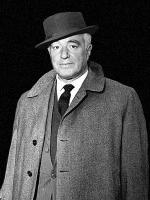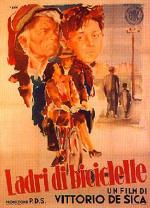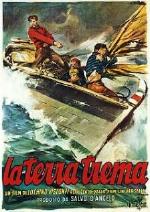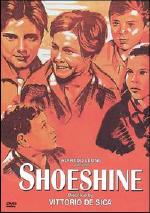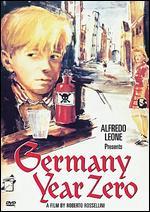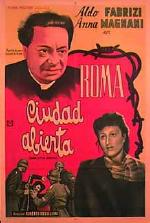Italian Cinema
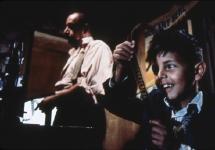 The history of Italian cinema began with a few seconds footage of Pope Leo XIII blessing the camera. Historical dramas were most popular in these early years before sound. During and after WWI, funds were short and nothing much of interest was made until the 1920s. With the rise of fascism the film industry was encouraged and in 1937 Cinecitta was built on the outskirts of Rome. Literally a 'cinema city', it contained everything a film maker could need or want, including theatres, and even a cinematography school. The slogan on posters at the time read "Cinema is The Most Powerful Weapon". Newsreels and propagandistic documentaries were filmed here but by 1939, feature film productions were underway. Visconti ('Ossessione'), Rossellini (Rome, Open City') and De Sica ('Bicycle Thief') all began their careers here. Post-war, two distinct trends emerged in Italian cinema: on the one hand, the neo-realist films of Rossellini and De Sica, made chiefly on location in the streets of Rome and surrounding towns; and on the other, the American megaproductions, filmed almost entirely on sets constructed in the Cinecitta studios. In 1948, 'Quo Vadis?', 'Roman Holiday (1952), 'Three Coins in a Fountain' (1954), 'Farewell to Arms' (1957), 'Ben Hur' (1958) and 'Cleopatra' (1961), to cite only the most famous. Federico Fellini shot most of his films, at least in part at Cinecitta and to this day the studios are used for television and film productions.
Mention must also be made of Pasolini, Bertolucci, Zeffirelli, Antonioni, Sergio Leone - Italy has given cinema some of its greatest individuals and auteurs.
Pictured: The lost kisses from 'Cinema Paradiso'
The history of Italian cinema began with a few seconds footage of Pope Leo XIII blessing the camera. Historical dramas were most popular in these early years before sound. During and after WWI, funds were short and nothing much of interest was made until the 1920s. With the rise of fascism the film industry was encouraged and in 1937 Cinecitta was built on the outskirts of Rome. Literally a 'cinema city', it contained everything a film maker could need or want, including theatres, and even a cinematography school. The slogan on posters at the time read "Cinema is The Most Powerful Weapon". Newsreels and propagandistic documentaries were filmed here but by 1939, feature film productions were underway. Visconti ('Ossessione'), Rossellini (Rome, Open City') and De Sica ('Bicycle Thief') all began their careers here. Post-war, two distinct trends emerged in Italian cinema: on the one hand, the neo-realist films of Rossellini and De Sica, made chiefly on location in the streets of Rome and surrounding towns; and on the other, the American megaproductions, filmed almost entirely on sets constructed in the Cinecitta studios. In 1948, 'Quo Vadis?', 'Roman Holiday (1952), 'Three Coins in a Fountain' (1954), 'Farewell to Arms' (1957), 'Ben Hur' (1958) and 'Cleopatra' (1961), to cite only the most famous. Federico Fellini shot most of his films, at least in part at Cinecitta and to this day the studios are used for television and film productions.
Mention must also be made of Pasolini, Bertolucci, Zeffirelli, Antonioni, Sergio Leone - Italy has given cinema some of its greatest individuals and auteurs.
Pictured: The lost kisses from 'Cinema Paradiso'
De Sica Collection: Bicycle Thieves / Miracle in Milan / The Roof (1948)
Director: Vittorio De Sica
Starring: Lamberto Maggiorani, Enzo Staiola, Lianella Carell, Emma Gramatica, Paolo Stoppa
The father of Italian neorealism, master director Vittorio de Sica won three Best Foreign Language Film Oscars for his compelling portraits of working... Read more
Bicycle Thieves ( aka The Bicycle Thief ) (1948)
 8.3/10
8.3/10

Director: Vittorio De Sica
Starring: Lianella Carell, Lamberto Maggiorani, Enzo Staiola
Aka 'The Bicycle Thief.' Vittorio De Sica's remarkable 1948 drama of desperation and survival in Italy's post-war depression earned a special Oscar fo... Read more
La Terra Trema (1948)
 7.9/10
7.9/10

Director: Luchino Visconti
Luchino Visconti's epic-saga of Sicilian fisherman remains one of the most important films of Italian neo-realism. Shot entirely on location in Sicily... Read more
Shoeshine ( Sciuscia ) (1947)
 8/10
8/10

Director: Vittorio De Sica
Starring: Franco Interlenghi, Rinaldo Smordini, Annielo Mele, Bruno Ortenzi, Emilio Cigoli
An early must-see example of Italian neo-realist cinema from Vittorio De Sica, ranking with such other classics as his 'Bicycle Thieves' (1948), 'Umbe... Read more
Germany, Year Zero (1947)
 7.9/10
7.9/10

Director: Roberto Rossellini
Starring: Edmund Moeschke, Werner Pittschau, Barbara Hintz
With a lineup of non-professional actors and made in the neo-realist style, this lyrical view of Germany in the immediate postwar period has some magn... Read more
Open City ( aka Rome, Open City ) (1945)
 6.4/10
6.4/10

Director: Roberto Rossellini
Starring: Anna Magnani, Aldo Fabrizi, Marcello Pagliero
Aka "Roma, Citta Aperta". A superb film based on the true story of Don Morosi, a priest and resistance worker shot by the Germans in wartime Rome. Fil... Read more
Ossessione (1942)
 7.8/10
7.8/10

Director: Luchino Visconti
Starring: Massimo Girotti, Clara Calamai, Juan Delanda
A.k.a. 'Obsession'. One of the great revelations of the cinema: Luchino Visconti's adaptation of James M. Cain's 'The Postman Always Rings Twice', abo... Read more
